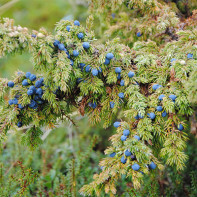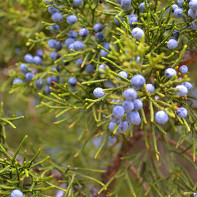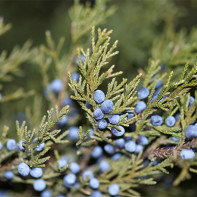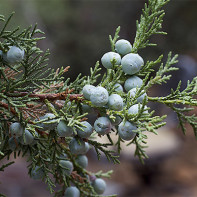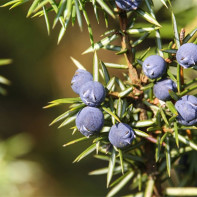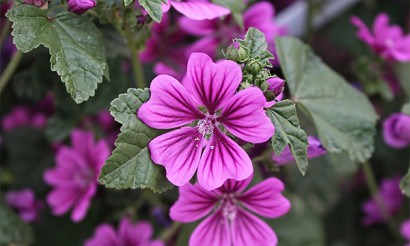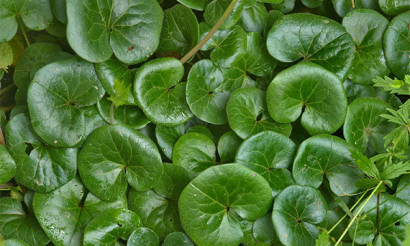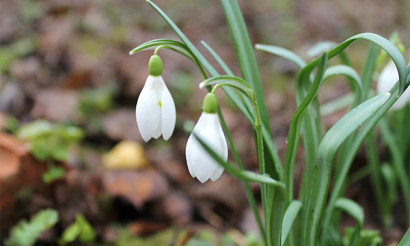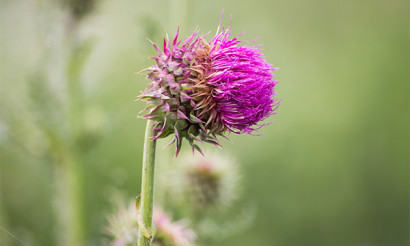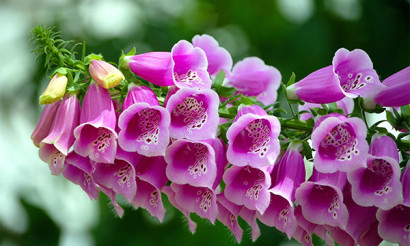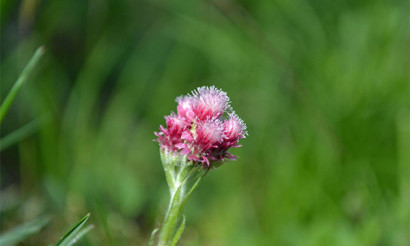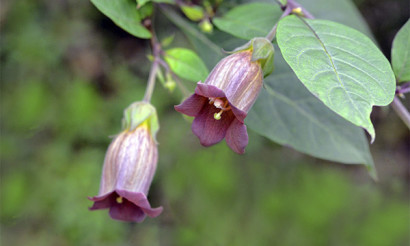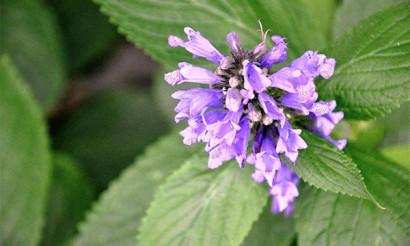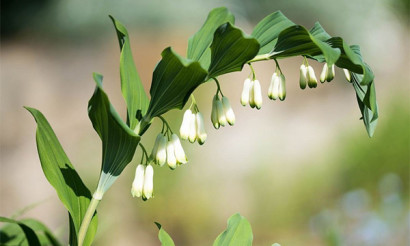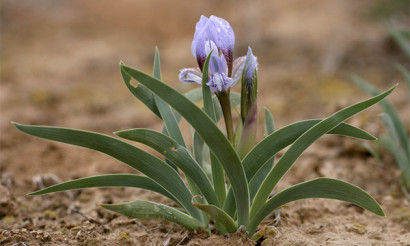Juniper: medicinal properties and contraindications
About the useful properties of juniper has been known since ancient times. Almost all parts of this plant are characterized by strong therapeutic properties. From the needles and dried fruits of the culture produced oil. This product is widely used in various spheres.
- Chemical composition
- How it looks and where it grows
- Types of
- Harvesting and storage
- How to tell the difference between thuja and juniper
- Therapeutic properties of juniper
- For Women
- For Men
- In pregnancy
- Breastfeeding
- For children
- When losing weight
- Juniper in folk medicine
- Kinds of medicinal compositions
- Infusion
- Tincture
- Decoction
- Tea
- Ointment
- Juniper oil: properties and application
- Cosmetic applications
- Culinary Applications of Juniper Berries
- Can I eat berries?
- How to use juniper broom for a bath
- Contraindications for use
- Interesting facts about juniper
Juniper is a long-lived, evergreen tree or shrub. It received this name because it grows between spruces. For medicinal purposes the fruits are usually used, which are characterized by diuretic, choleretic, antibacterial and expectorant effects. In addition, they have a soothing effect on the nervous system, purify the blood and help relieve inflammation.
In the people this plant has many other names, the most common being heather. It is important to know the unique and useful qualities of juniper.
Chemical composition
Due to its rich chemical composition, the shrub has many healing qualities, which have long been studied. The fruits, needles and root part of the culture contain such substances as flavonoids, glycosides, bitterness, essential oils, organic acids, tannins, as well as camphor. It is important to understand that some of these substances not only have medicinal characteristics, but can also harm human health.
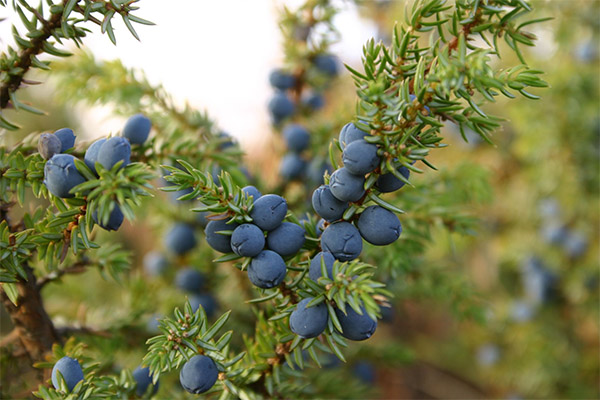
The presence of many enzymes in the composition of the plant helps to resist various diseases. The basis of juniper oil contains terpene, borneol, tannins, coloring agents, ascorbic acid, minerals and acids of organic origin.
A number of studies have shown that juniper oil has a strong phytoncidal effect. Thus, we can notice that the air is cleaner and fresher in places where this crop grows. People with certain diseases, as well as weakened animals often visit such places.
The essential oil contained in the product contributes to the purification of internal organs. In addition, the culture is endowed with diaphoretic, cleansing, antimicrobial and biliary action.
In addition, products based on juniper help to improve digestion, stimulate lymph flow and provide healing of damaged skin.
It is also worth noting that the plant has a beneficial effect on the CNS, which helps to cope with insomnia.
How it looks and where it grows
Juniper is a coniferous shrub. It can reach up to 3 m in height. The crop grows most often in the Northern Hemisphere, northern Africa and Asian countries. It prefers temperate and tropical climates, dry slopes. Juniper has a straight trunk and spreading branches with prickly needles. Juniper berries are similar in appearance to the scales that form small-sized cones. The color of the fruit varies from green to brown.
Types
There are several varieties of heather known. Numerous species differ from each other in color, shape and height of the crown. First of all, it is necessary to note the common juniper. This species is most often found in nature. This variety easily takes root in almost any climatic conditions.
The original is also a virgin juniper. Such a plant can have the form of an upright tree with different heights or a horizontal shrub with many shades of needles. The advantage of this species is that it has a developed root system, which allows the plant to cling to literally any soil.
Cossack juniper is a shrub that is unpretentious, often grows in plots as an ornamental plant and prefers lots of light. This species also has many varieties, which differ in stalking and tall shrubs.
There is also the horizontal juniper, which is very similar to the Cossack juniper. It grows in Canada and the United States, most often in the mountains and on the banks of rivers. The plant is undemanding to the composition of the soil, prefers sunny areas, but also gets along well in the shade. In the first years it grows very slowly, but a mature specimen can grow up to 10 cm a year.
Chinese juniper is also known. This light loving variety is native to Asia. The variety is characterized by drought tolerance and can grow even in poor soils and polluted areas.
Rocky species is distinguished by its considerable height. Thus, the plant can reach a height of 10 m and more. Such trees have a reddish-brown bark. The crown is narrow and low. It usually grows on the slopes of the Canadian and American mountains.
It is native to the Chinese and Taiwanese mountains. However, the plant is also able to grow well in our regions. This species prefers light but does not like cold and frost. The wood is resistant to rotting.
Harvesting and storage
Harvest the heather fruits when they are completely ripe. They should be blue-black in color. They are usually harvested from the end of August until the end of October. To do this, wrap a piece of paper or thick cloth around the shrub. After that begin to trumpet the tree. Fallen berries are collected and sent for drying.
Dry the fruits can only be in special devices. Dried raw material is stored in a dark place, in a container of quality wood. In addition, it should be tightly closed. Shelf life of such medicinal plant raw materials is usually 2 years.
How to tell the difference between thuja and juniper
Thuja and juniper are both conifers that are members of the Cypress family. However, if you look closely, they have many differences. For example, the heather has needle-like leaves and the thuja has leaves that change with age to form scaly leaves.
To distinguish between these two species, you need to study their biological characteristics. Thuja, for example, grows very fast and can reach a height of up to 70m with a trunk girth of around 6m. However, often in garden plots there are pyramidal or spreading shrubs that are up to 7 m high, branching. Such a variety is called a western variety. Despite its high frost resistance, the plant is not able to grow in the conditions of the Far North. The trunk of such a tree is smooth, gray in color. Old plants have longitudinally-wavy bark, peeling off in narrow ribbons. Small, scaly needles are tightly pressed together. The cone usually forms two seeds each. The plant blooms from early April to May. From June to September, fresh twigs are collected and harvested for therapeutic purposes.
The main difference between thuja and juniper is that the latter representative of the flora has a low growth. On average, these trees reach 3 m, it is very rare to find specimens up to 15 m high. There are also low-growing shrubs that are practically creeping on the ground. This is how you can tell if you are a juniper, as thuja trees do not have such varieties.
It flowers in May and bears fruit from October to November. The fruit is a cone with three seeds each. Most varieties have an edible fruit. In the wild, juniper can be found not only in pine forests, but also in mixed forests.
The medicinal properties of juniper
It has already been said that the plant is considered a powerful natural diuretic. From the fruits of heather are made tinctures and decoctions, which are prescribed for a prolonged inflammatory process of the urinary system. Specialists recommend using juniper in the presence of kidney stones, increased swelling, for disinfection of the urinary tract.
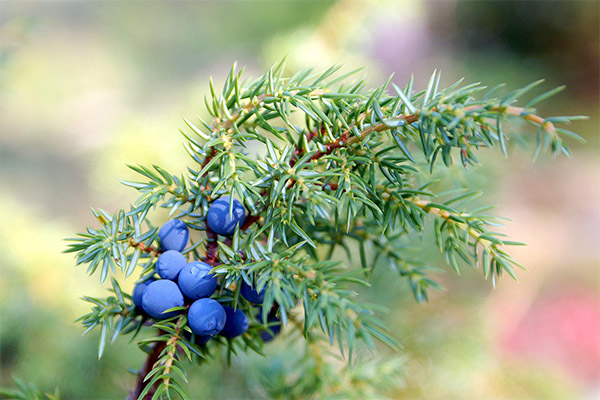
The healing qualities of the fruit of juniper are also used in the treatment of diseases of the digestive tract. Preparations based on this plant can stimulate appetite, restore digestion, eliminate nausea, heartburn and cope with diarrhea and gas. To restore the normal function of the digestive tract, the fruit can not only be used to prepare solutions, but also chewed fresh.
The plant is also characterized by its calming effect. Juniper relaxes the nervous system. Healing compositions are recommended for use in neuroses and sleep disorders. Healing effect is also distinguished by baths, which are prepared from the needles of the plant. Take such procedures is recommended in the evening, before going to bed.
Juniper has a beneficial effect on the respiratory system. The plant is able to reduce the viscosity of sputum. Thus it helps with diseases of the bronchi. With colds and flu is recommended to treat living rooms with the smoke of such needles or attend aromatherapy procedure.
Preparations based on heather are able to help with painful joints. Decoctions and tinctures based on the culture are effective for gout, neuralgia, limb paralysis. You can also use them externally, as lotions and compresses.
Such herbal medicines are also used in the fight against microbes. They can treat the skin for dermatitis, eczema, ulcers, scabies. Highly useful is the decoction of the plant, which is used to rinse the mouth with inflammation of the gums and teeth. The tincture is recommended for use in inflammation of the ears. In this case, it is necessary to drop the mixture of culture into the ears.
For women
Representatives of the weaker sex use decoctions and infusions of juniper for sanitation of the vagina. Such remedies are very effective in inflammation of the genitals. The plant can even cure inflammation of the appendages. During menopause, you can take a tincture of juniper, as well as a session of aromatherapy. This is due to the fact that the plant perfectly copes with nervous system disorders, which are caused by changes in the hormonal background of a woman. Regular chewing of berries also brings great benefits to the female body.
Healing tincture on an alcohol base has a positive effect on the pelvic organs. This restores blood circulation in these organs, as well as normalizing the menstrual cycle. Decoctions are indicated for various inflammations of infectious origin.
For men
Men are recommended to use alcoholic tinctures, which are made from the bark of the tree, the rhizome. They are effective for male sexual impotence. Drugs can restore blood flow in the pelvic area, normalizing sexual activity. Also herese is famous for its healing effect in pathologies of the urogenital system. If properly prepared decoction, you can cope with urethritis, as well as infectious prostatitis. The plant is used as an additional medicinal agent in the complex treatment of adenoma of the prostate gland.
When pregnant
During pregnancy, it is not recommended to use remedies based on herese, as the drugs can provoke uterine contractions, lead to miscarriage, premature birth and even stillbirth.
When breastfeeding
When breastfeeding, it is also undesirable to take herbal preparations based on juniper, because the baby's body may react negatively to such a component.
For children
All solutions and other preparations based on such herbal raw materials are allowed for children over 5 years of age. However, even in this case, it is necessary to consult with a pediatrician before treatment.
When losing weight
Juniper will be beneficial even in the case when you need to get rid of excess weight and get into shape of your figure. In this case, you can use juniper oil. This substance will help to cope at once with the three main problems faced by all thinners. First of all, it is cellulite and decreased tone of the dermis. In this case juniper oil will help to remove excess fluid from the body and various products of breakdown of fats. As a result, the skin will gain elasticity, and the so-called orange peel will disappear. Also, this substance is able to restore the metabolism, clean the intestines and improve the excretory system. This will remove all the waste products that accumulate in the body.
Another problem with which this oil will help to cope - it is an increased appetite. This oil will help to cope with the feeling of hunger, as well as prolong the feeling of fullness.
The aroma of juniper improves mood, helps cope with anxiety, increases self-confidence, allowing you to cope with discomfort.
To get rid of excess weight, juniper oil is taken both externally and internally. During breakfast, it is recommended to put a few drops of oil on a piece of bread. In addition, twice a day you should add to 1 tsp. honey in a couple of drops and consume between the main meals. Outside use is based on using the oil as a massage composition. To make a massage, rubbing or wraps, you need to mix this pine essential oil with base oil in a ratio of 1:5.
Juniper in folk medicine
Since ancient times, the raw material from such a shrub has been used to treat various kinds of diseases. Currently, many effective recipes are popular.
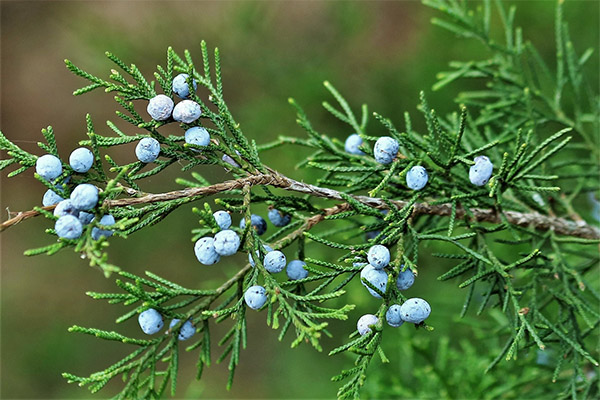
- For example, a healing infusion can be used to treat gout. In this case, 10 g of dried berries soak in a mug of water. The resulting mixture should be boiled for 30 minutes, and then insist for another 60 minutes. Use the finished decoction by 1 tbsp. three times a day.
- For the treatment of painful joints is suitable alcoholic tincture. To prepare it, mix 20 berries with 100 ml of alcohol. Insist the composition for 10 days. In this case, store it in a glass container, in a dark room, protected from sunlight. Filter the ready tincture. Such a solution is used for rubbing sick joints.
- Also preparations based on juniper are used in the treatment of allergies. In this case, you should use the branches and needles of the plant. Crush the raw material and mix it with a glass of hot water. Then place the mass on a steam bath and boil for about 10 minutes, and then filter it. The resulting composition should be taken in 3 times during the day by 1 cup.
- Allergic reactions can also be eliminated with a juniper bath. In this case, take the same plant material in an amount of 300 g, crushed and mixed with 10 liters of water. Give the mixture some time to infuse, and then simmer over low heat for half an hour. Then strain the liquid and add to the bath. The bath procedure should last for 15-20 minutes. The course of treatment is 10 procedures. In addition, such a therapeutic bath will help with neuroses, sleep disorders and depression.
- To lift your mood and get rid of stress, it is recommended to drink a drink based on juniper fruit. Take 1 tbsp. chopped dried berries, add a glass of water, then place on the fire and boil for 30 minutes. After that, add honey or sugar to thicken the mass. The resulting syrup to drink 1 tbsp. 3 times a day for 30 minutes before a meal.
- Effective in this case is a brew. To obtain it, 50 g of dried fruits, pour a glass of hot water and infuse for 2 hours. At the end of this time to filter the liquid. Add 1 tsp. sugar and put in a water bath for 5 minutes. Take the remedy in the same way as the syrup.
- Juniper is also used for respiratory diseases. In this case, you can prepare a mass intended for inhalation. In this case, take a few berries and add 1 liter of hot water. Allow the mass to infuse for 10-15 minutes. After that, open the pot with the healing decoction and use the therapeutic steam for inhalation. To prepare a broth, you need to chop 2 tbsp. dried fruits and add 500 ml of hot water. Such a mixture should be boiled over low heat for about 10 minutes. Take the cooled drink 2 tsp. three times a day.
- If you mix 1 tbsp. berries with a glass of boiling water, infuse 3-4 hours and strain, you get a remedy that will help in the fight against diseases of the kidneys and urogenital system. The resulting composition to drink 1/3 cup in 3 drinks a day.
- Traditional medicine uses antiviral drugs for the treatment of herpes, which, unfortunately, are not able to completely eliminate the disease. Such remedies only move the disease into remission. As a result, at the slightest hypothermia or reduced immune system, the disease reappears. In this case, a folk remedy will help - tea from juniper berries. The benefits of such a drink due to a high concentration of phytoncides and antiviral components. Prepare such a tea is very simple. You just need to take 0.5 tsp. dried raw materials and pour a glass of boiling water. Insist the medication for 20-25 minutes. Take the solution three times a day.
- To treat sore throats, crush 1 tsp. dried fruit and pour 250 ml of boiled water. Insist the mass in a thermos for an hour. After that, filter and divide into 3 parts. Use the solution to gargle your throat. It is best to do this after a meal.
- To cleanse the blood and get rid of intoxication of the body, you need to consume fresh berries on an empty stomach. The treatment should begin with 1 fruit per day. Gradually the dosage increases to 15 berries.
Types of medicinal compositions
On the basis of medicinal plant raw materials, represented by heather, are prepared various medicinal compositions designed to eliminate various pathologies.
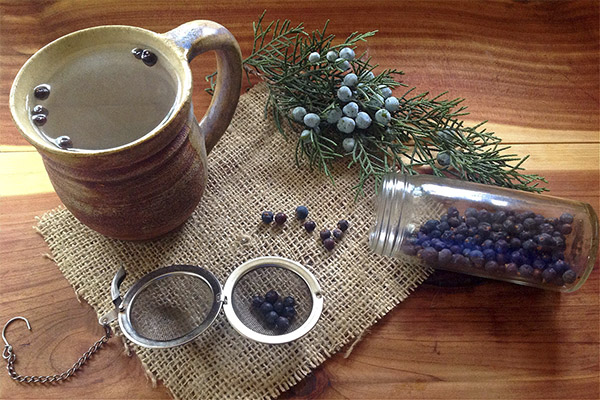
Infusion
To prepare an infusion, the usual technology is used in a ratio of 1:20. That is, 5 g of crushed juniper fruits pour 250 ml of boiled water, cooled to room temperature. Such a solution to insist for 10 hours or cook in a steam bath for 15 minutes in a tightly closed container. Before use, filter and drink 1/3 cup 20 minutes before a meal. Frequency of intake of the drug is 3 times.
Tincture .
To obtain a tincture, 15 g of berries should be mixed with 100 ml of alcohol. Insist the mixture in a dark, light-protected place for 10 days. Use the finished solution to treat rheumatism as a painkiller.
Decoction .
Healing broth is prepared as follows: boil 100 g of dried berries in 1 liter of water. Filter before use and use as directed. Such a solution can be added to bath water. This will help with gout and joint pain.
Tea
To make a useful tea, take 2 tbsp. juniper berries, place them in a porcelain kettle and pour 1 liter of boiling water. Use the resulting solution as a tea. It is an excellent remedy for inflammation of the liver.
Ointment .
To create an ointment, you will need 1 cup of ripe pine bush fruits, 2 cups of vegetable oil and 2 tablespoons of beeswax. The mixture is very easy to prepare. To begin with, soak the fruit in distilled water for several hours, or better yet, leave the mixture overnight. After that, drain the liquid, and slightly crush the berries and put them in a small container. Pour the juniper pulp with olive oil or other vegetable oil and place it in a steamer. You can also use a normal water bath. After a few minutes, remove the mass from the heat, cool a little. After that, separate the berries and the oil liquid. Pour the oil back into a container and mix with beeswax. With regular stirring over low heat, melt the wax. Pour the ready ointment into a jar with a lid. After cooling to room temperature, place the composition in the refrigerator to solidify. Use the ointment for pain in the joints and muscles, applying massage motions on the body.
Juniper oil: properties and uses
Oil of heather is suitable for treating almost any pathology associated with the digestive system. In addition, the plant component will help to rid a person of infectious and viral diseases.
If you have a cold, it is enough to dissolve 2 drops of the oil in 15 ml of honey. Such a mixture can be used for any hot tea, which is consumed 3 times a day.
In the presence of edema in the limbs, an herbal drink will also be effective. In this case, add 3 drops of juniper oil to a cup of boiled water. Use this composition twice a day, the drink should be hot.
To cleanse the body of toxins, you can conduct a course of treatment. In this case, you should carry out four procedures during the year. The healing composition in this case is consumed only for 3 days. On the first day, 5 hours before a meal you should mix 1 drop of juniper extract with 30 ml of olive oil. On the second and third day, add 1 drop of such product to your food 3 times a day. All this procedure is accompanied by taking plenty of water.
To reduce body weight, dilute 15 ml of honey and 2 drops of pine essential oil in 100 ml of purified water. Use the effective composition for a week three times a day.
Regular use of the plant product will help in a short time to restore metabolic processes in the body and saturate it with a useful complex of minerals and vitamins.
In addition, juniper oil is recommended for use in the treatment of cystitis, arthritis, varicose veins, polyarthritis. Also this composition can be used to treat deep wounds and other skin damage. It should be noted that allergies, ulcers, diabetes, hemorrhoids can also be treated with this herbal composition.
Cosmetological applications
In cosmetology, only the essential oil of this medicinal plant is used. It is able to activate the growth of the hair follicle, making the hair light and silky. Such a component is added to various cosmetics that can cope with dandruff in a short period of time.
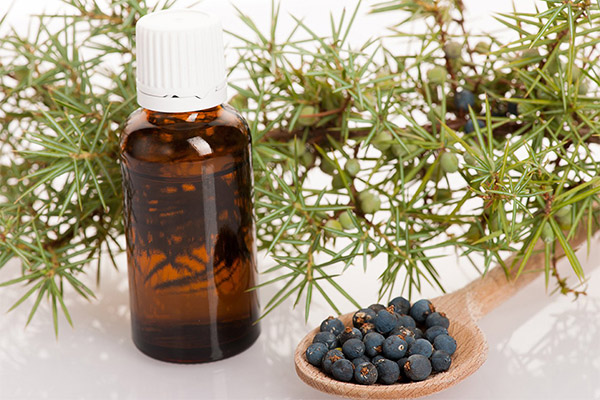
In addition, the oil is considered an effective remedy for facial skin, is an antiseptic of natural origin, which will get rid of acne. As for the ointment based on this plant, it tightens the skin, making it more elastic.
With an oily type of hair, a therapeutic mask of such a natural element is considered effective. In this case, it is necessary to combine 3 spoons of olive oil and 6 drops of juniper essential oil. Such a complex of substances warmed up and applied to the skin of the scalp, as well as to the strands of hair. After that, put on a polyethylene cap and leave the composition to act for an hour. At the end of the specified time, wash your head with an ordinary shampoo.
To quickly get rid of dandruff, add juniper essence to the shampoo used. The ratio is as follows: add 5 drops of oil to 1 tablespoon of the cosmetic composition.
Beneficial effect on the skin has a mask based on this oil. For its preparation you will need such ingredients as an egg white, as well as 3 drops of coniferous bush oil. First, whip the egg white until foamy, and then mix it with the oil. Mix the ingredients thoroughly. Apply the resulting composition to the face and soak for a quarter of an hour. After that, rinse the composition from the dermis.
With a problematic type of skin, you can prepare a special tonic. In this case, you will need 200 ml of still water and 5 drops of essential oils. Mix the elements well and pour into a convenient container. You can use such a cosmetic on a daily basis.
The oily liquid is popular due to its anti-cellulite action. Such a herbal composition helps to smooth the skin, toning it. With regular use, skin defects are smoothed out and some stretch marks disappear.
This herbal remedy can be used to nourish the skin. However, most of all, cosmetologists recommend its use with problem skin type, which is characterized by an oily epidermis prone to the appearance of acne.
The extract of such a tree helps to purify the dermis. Systematic use of the product will protect the skin from peeling, pimples and enlarged pores. It is enough to add a few drops of the oil to the cream, which is used for daily moisturizing of the skin.
In addition to quality skin care, the oil will help strengthen the structure of the hair. If you constantly add a small amount of vegetable oil from heather in your detergents, you can forget about itching, hair loss and brittleness.
Dermatologists advise including such a component in skin baths. It is popular as an antifungal agent. In addition, it will help get rid of corns, soften the skin and saturate it with useful enzymes.
Using juniper berries in cooking
Juniper berries are used in the culinary sphere as a spice. However, you should remember that if the berry cone is used for culinary purposes, their excess can lead to an overdose of this product. Thus, for 1 kg of any product, be it meat or fish, it is enough to use no more than 7 fruits of this plant. In this case, the fruits of heather are placed on gauze and added to the dish 20 minutes before the end of cooking. When everything is ready, the sack with berries is removed from the pot.
From the fruits of juniper you can also get an extract, which is used in the production of liquor. For example, the well-known drink gin is prepared on the basis of a tincture of juniper berries. Moreover, berries are added as a seasoning to sausage products, giving them a piquancy and richness of flavor.
For example, you can prepare a baked ham. Among the ingredients you will need 4 tbsp of soy sauce, a bunch of thyme and sage, a pinch of zira, a small amount of pickled onions, a pork ham weighing 3 kg, and a head of garlic.
For the brine we need to prepare 1 tbsp of marjoram, the same amount of juniper fruit, 0.5 cup of brown sugar, 2 tbsp of black pepper, a few bay leaves, a cup of salt and 1 tsp of dried rosemary.
First, you need to prepare a brine. To do this, boil a mixture consisting of 3 liters of water, sugar, herbs and spices. Let it cool down completely. Pour the cooled liquid into a big bowl and add 4 liters of boiled water.
Remove the skin from the ham, and the layer of fat should be no more than 1.5 cm. Place the meat in the brine for 10-12 hours, then turn it over, salt it again and keep it in a cold place for the same amount of time. Make deep incisions in the rump and stuff it with pickled onions and garlic. Then pour soy sauce over the ham, wrap it in a few layers of foiled paper and bake in the oven at 180 degrees.
Can I eat berries?
Only the berries of juniper are considered edible. The fruits of other species contain toxic substances that are dangerous to human health. Edible cones have a globular shape, with a diameter of up to 9 mm. In the upper part there is a groove with 3 rays. The fruits are dark blue in color, the flesh has a brown-green color. They have a bright and pleasant aroma, sweet and tart taste. There is a piney aftertaste.
Since cones are enriched with esters and resins, uncontrolled consumption is dangerous to health. For preventive purposes, it is enough to eat 6-7 raw berries.
How to steep a broom for a bath from juniper
To begin with, you need to know how to prepare brooms. Such brooms for the bath are not prepared for several years in advance, because the dried branches of the coniferous tree begin to crumble quickly when brewing. It is recommended to prepare brooms in warm and dry weather. In this case you can choose both young shoots and mature branches with a length of 50-60 cm. Harvested raw material should be placed in a dry room in the shade. This is necessary in order that the future broom was elastic.
After harvesting and drying the branches, you can steep the juniper broom. It is very easy to do. First soak the broom in cool water for 2-3 minutes. After that, carefully shake off the rest of the water, put it back into the basin and pour boiling water. After half an hour in hot water, the broom can be used as directed.
Contraindications for use
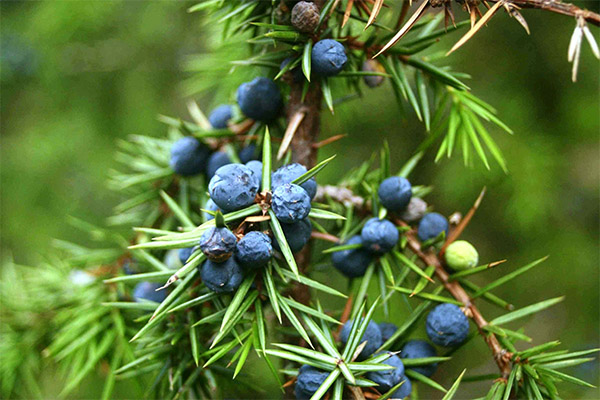
The composition of this plant contains substances that have a pronounced effect on the human body. Therefore, you should not independently use the raw material for therapeutic purposes and prepare compositions based on it. There are a number of contraindications, which should be taken into account before starting treatment with such a herbal component. In chronic liver and kidney diseases, abnormalities of the gastrointestinal tract, heather can do more harm than good.
High blood pressure, pregnancy and lactation period, as well as age under 5 years - these are also restrictions on the use of products on the basis of juniper.
In addition, you must remember that long-term treatment with preparations and tinctures based on heather is contraindicated. The maximum course of treatment is 2 months. The duration of treatment may be increased only by a doctor, subject to constant observation of the patient.
It should also be noted that self-treatment is dangerous to health. It is very important to first consult a specialist. Drugs are quite strong and with the wrong dosage and duration of intake can be harmful.
Interesting facts about juniper
- There are long-lived junipers in the world, which are about six hundred years old.
- Over time, the wood of the heather becomes more durable.
- In some countries the fruit of such a plant is used for the production of beer and vodka.
- Juniper is used to make paint, which has an antiseptic effect and is used to paint wooden surfaces.
- Ware made of juniper wood is used for long-term storage of food.
«Important: All information on this site is provided for informational purposes only for informational purposes only. Before applying any recommendations, consult a health care professional. specialist. Neither the editors nor the authors shall be liable for any possible harm caused by materials."

